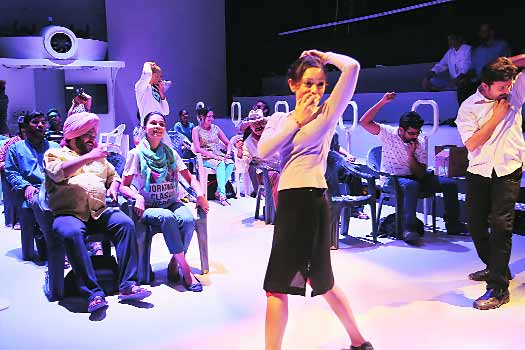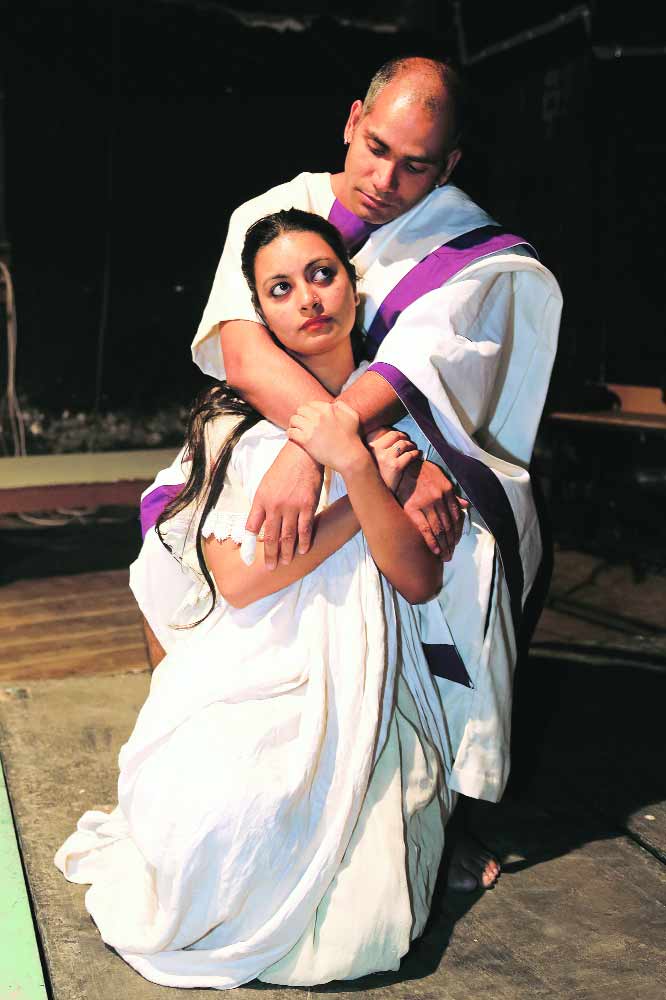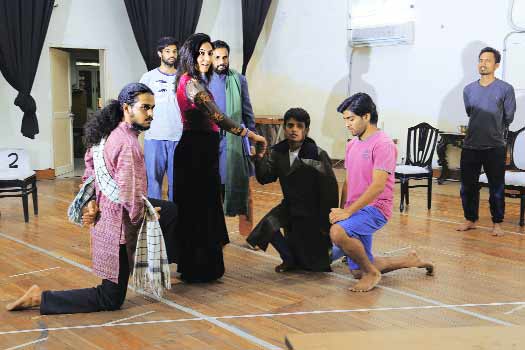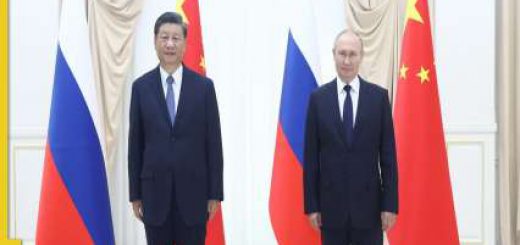National School of Drama: Plays, Uninterrupted
Rehearsals at the National School of Drama. (Photos courtesy: S Thyagarajan)
In rehearsal rooms and auditoriums of the National School of Drama (NSD) in Delhi, death lurks in many forms. It wears a robe in Julius Caesar, floats as a dark memory of Partition in Bitter Fruit, becomes a powerful, most infallible weapon in the hands of Richard III and, in Lorem Ipsum, it is a co-passenger in a plane that takes off but may not land. In these plays, top directors of the country — Raj Bisaria, Neelam Mansingh Choudhury, K S Rajendran and Abhilash Pillai — have got together with student actors of NSD, creating a dramatic synergy of experience and raw energy. A peek into the scripts:
Stories of Manto and Franca Rame make up Bitter Fruit.
Bitter Fruit
A month ago, Neelam Mansingh Chowdhry met third year students of NSD armed with a suitcase full of books by writers ranging from Ismat Chugtai and Manto to Franca Rame. “I said, let’s read and let’s talk about loss, of fractures, of ruptures, of migration,” she recalls, as the actors go through their paces for the play, Bitter Fruit. The play is a collection of stories, some derived from Manto, some improvised from a line or two from him, and others from Rame.
One story follows the love between a Hindu girl and a Muslim boy who would meet on the terraces of their adjoining houses, another is an account of a raped woman and yet another, is about a woman who avenges the death of her father. Chowdhry’s signature live music and a play of elements such as water and smoke run through this production. “In a strange way, all the stories that were chosen have a lot to do with loss, and with sex and death, both primordial energies,” she says.
Date: May 12-15
 Air stewardesses demonstrate safety instructions in Lorem Ipsum.
Air stewardesses demonstrate safety instructions in Lorem Ipsum.
Lorem Ipsum
A play that calls itself Lorem Ipsum is clearly flying on a different plane. The title is a Latin term referring to a dummy text used in publishing and graphic design. But, an alternate meaning alludes to the nature of pain. Third year students, playwright Rajesh Tailang and director Abhilash Pillai have created a play, in three parts, which takes off from recent news about airplanes, from the missing Malaysian Airlines to the crashed Germanwings craft. Audiences are given tickets designed like boarding passes and sit as passengers on stage. “Hijack is one of the themes of the play. There is a kind of stigmatisation that happens with a kind of people if they are wearing skull caps or have beards,” says Pillai. Gender issue underlines another segment, of an air stewardess who has a backstory of abuse. The third story confronts every passenger’s worst terror — mechanical failure. “If flying is about freedom, falling is always layered with many meanings,” says Pillai, about the scene in which a woman who trains pilots, finds herself on a flight which has hit turbulence.
Date: May 8-12
 Roman era is recreated in Julius Caesar.
Roman era is recreated in Julius Caesar.
Julius Caesar
Raj Bisaria directed his first Shakespearean play, Othello, in 1966. Julius Caesar happened in 1984 and again in 1990 and now, for the third time, Bisaria recreates the life of the great Roman general who was killed by his trusted friend Brutus. For Bisaria and his group of second year students, however, Julius Caesar is also about a political assassination and the destruction of democracy. “What we are trying to show is that something goes wrong in 44 BC and, after that, we will get to know about the ideals of democracy in 1789, with the French Revolution,” says Bisaria, who has worked on a recent Hindi translation by a writer from UP.
Date: May 22-25
 Richard III gets a Hindustani touch.
Richard III gets a Hindustani touch.
Richard III
What is it that bothers Richard III? At the psychological level, he is born with a deformity and in the opening scene, he says, ‘I desire to be a villain’. “His plans are chaotic and increasingly dangerous and he systematically goes about achieving the throne,” says KS Rajendran about Richard III, one of William Shakespeare’s most unwieldy plays. Working with second year students and a translation created especially for the production, Rajendran says that this is possibly the first major Hindustani performance of Richard III. Richard’s path to the throne is washed in the blood of his rivals and dissenters but it is when he appears like a holy man, flanked
by two priests, and pretends to refuse the crown that the play begins to look like a plagiarism of contemporary politics. Are resemblances of living people and events mere coincidences?
Date: May 27-30
The plays will be held at NSD, near Mandi House metro station.
Tickets are priced at Rs 30.
Contact: 23389402
Source:: Indian Express






